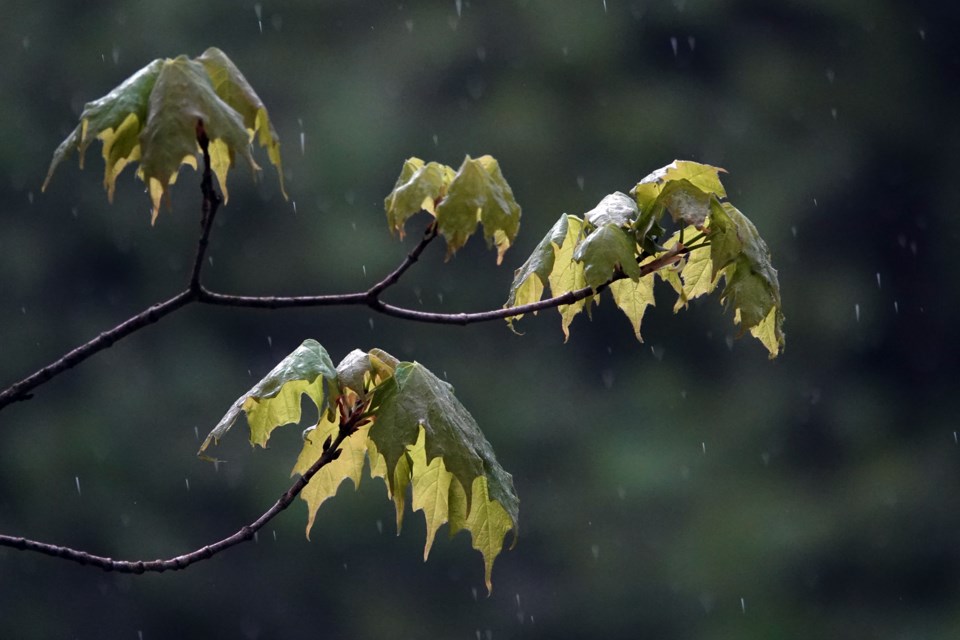My agenda for the day was fairly loose ... this column to write, some gardening to do, and a bit of chainsaw work to be conducted on a fallen oak tree. Not having a clue as to what to write about, I instead stepped out onto the deck to see in which direction I should proceed: the half-planted garden or the distant woodlot?
To aid in my decision making, I took a deep breath followed by a slow release. “Hmm. Smells like rain.” And with that revelation I turned back inside and began to write.
Rain comes with a low air pressure system, and this low pressure situation allows odour particles to move about more freely. The dampness of the air also helps as odour particles stick to moisture droplets and thence stick to the inside of my nostrils, thence further giving my brain time to analyze these field samples.
The wetter the air (read: it’s raining) the more likely the ozone gets a chance to swing into action. Ozone has three oxygen molecules (come on, surely you remember that from Grade 13 Chemistry) and as such is unstable with a free oxygen molecule looking for something to do.
The raindrops themselves are a big factor in making the world smell nice. First, they gather ozone from high altitudes and carry the molecules downwards. At the same time, the ground is being bombarded by millions of raindrops crashing and smashing into terra firma.
This pummelling of the soil releases all sorts of odour particles which are thrown upwards. And where did these odour particles come from? Leaf mould and rotting twigs! And how does this leaf mould get there? By the combined efforts of billions of springtails (also known as ‘snow fleas’ in another season) and soil bacteria that breaks down organic material.
This scent that we associate with a spring rain is from a process called ‘petrichor’, a Greek word that means ‘essence of rocks’. When you are down on your knees sticking bulbs in the ground, that earthy smell you smell is from petrichor.
Our noses certainly let us know when a skunk has stopped by, or when you've just walked through a patch of wild mint, but other than these types of billboard-sized aromas, our sniffer is usually regulated to being just an alternative way to bring air to our lungs, a task undertaken about 23,000 times a day.
While perusing a stack of books in my room that have been bought over the years for the express reason of expanding my literary horizons (although, for a multitude of very good excuses, have not yet been read), I came upon a most interesting one published way back in 1990 (the book stack is, ahem, very high).
In her book, A Natural History of the Senses, Diane Ackerman addresses each of our five senses in detail, examining how they enhance our experiences of the biological world around us.
Ms. Ackerman's chapter on the sense of smell deals with the biology and history of scents and noses; from the theory of the evolution of the nose developing before the brain, to the intimate relationship of Napoleon and Josephine had over the scent of violets.
While I found the whole book entertaining and insightful, one of Diane’s passages really struck home: "Smells detonate softly in our memory like poignant land mines, hidden under the weedy mass of many years and experiences. Hit a tripwire of smell, and memories explode all at once. A complex vision leaps out of the undergrowth."
No doubt you have your own set of olfactory tripwires: hot dogs on a barbecue; lilacs by the garden’s edge; pizza fresh from the oven, white pine on Canadian Shield ... or a distant skunk marking its territory. It truly is amazing how a whiff of some odour or another can cause instant mental ruminations of a place or time from long ago.
Looks like the rain, for now anyway, has slipped by to the south and thus leaves me with opportunity to lean on a rake or fire up the chainsaw. Ah yes, the smell of chainsaw exhaust ... so many memories come attached with that!



